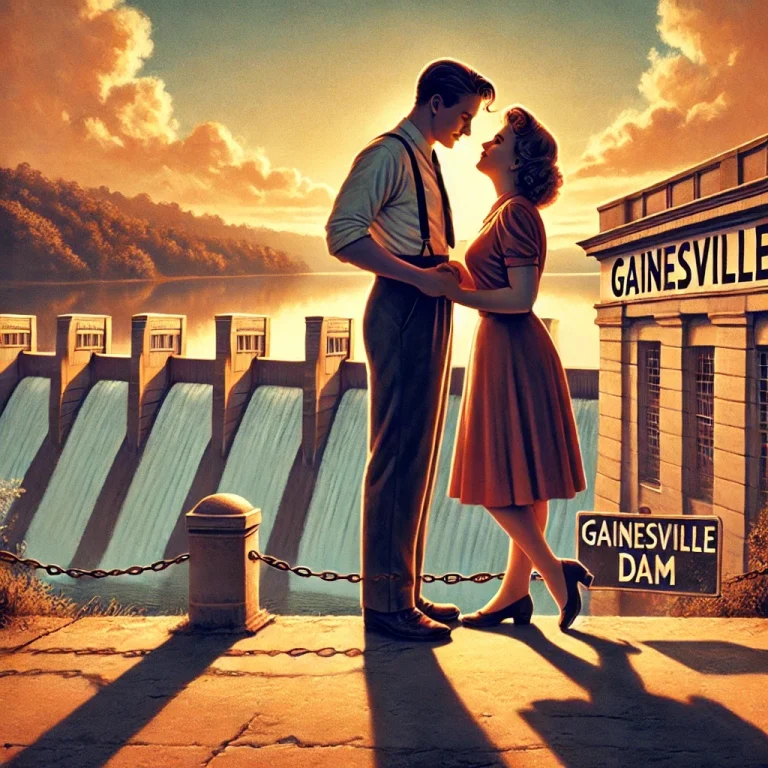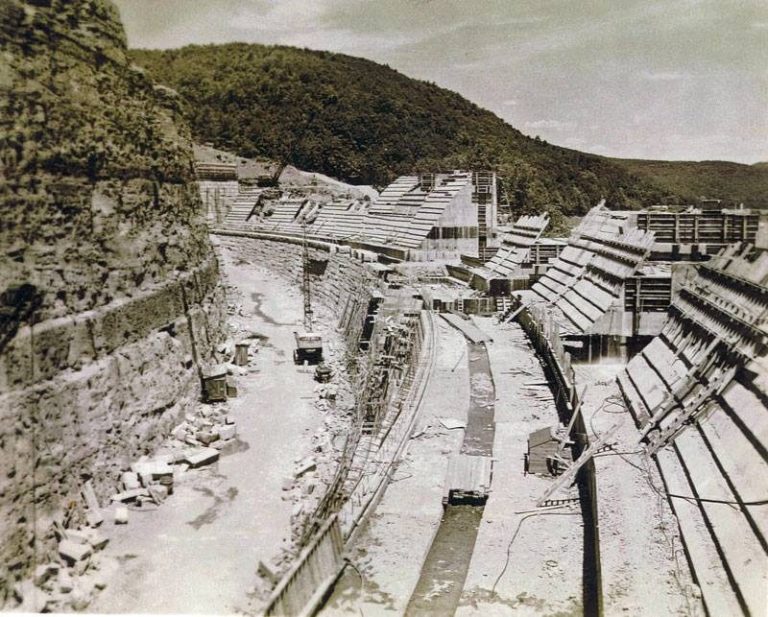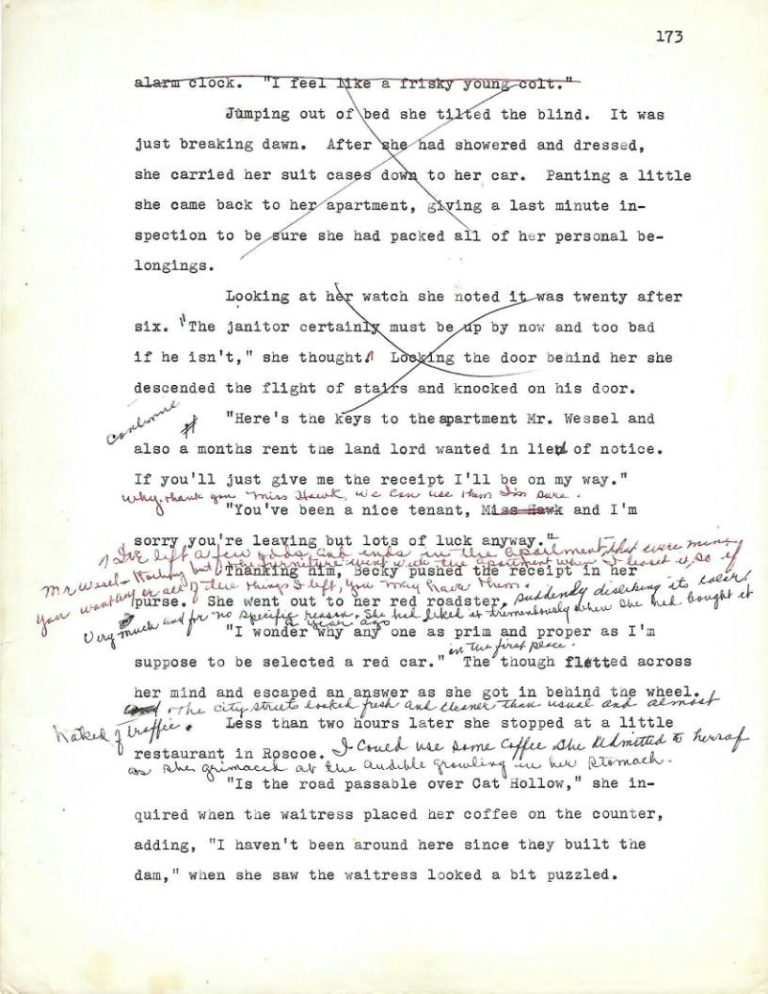Just Released...
In The Shadow of The Dam
Send us your comments!
Culture, Politics, Romance and Progress at Odds in the 1940s - As Much As Today.
IN THE SHADOW OF THE DAM seduces you by a world where forbidden trysts smolder in moonlit barns and whispered secrets echo beneath a reservoir under construction. IN THE SHADOW OF THE DAM, recently published by Ebook Bakery Books and the late author Bertha "Van" Edwards North, with grandson Bill Seymour of Connecticut and Rhode Island, captures much of life unvarnished.
It is also a legacy novel Seymour published honoring his grandmother, who 60 years ago used New York City’s oppression of small upstate rural villages, including Downsville, N.Y., to reveal the raw, rugged, romantic, and raucous lifestyles and lives disturbed by NYC's quest to take land at any cost. She died 25 years ago, never seeing her work published.
The book when written was so revelatory that publishers in the early 1960s refused to print it, fearing prosecution like Penguin Books saw for Lady Chatterley’s Lover under the UK’s Obscene Publications Act (1960). That sent a chill through U.S. editors, who feared both legal risk and moral backlash if they published anything deemed too “indecent.”
Journalist and writer Seymour said publishing her book was his "last fierce act of love" for his beloved grandmother, called "Nanny." It's an effort any grandmother would admire for having her work get long-delayed recognition. She fostered in him a past generation's interest in writing and literature while also cultivating genuine love and caring amid domestic violence and abandonment with which he grew up in his parents' household.
It fuses the raw intrigue of 1956’s Peyton Place with the sumptuous scandal of today’s Netflix Bridgerton and Sex/Life. Dive into a tapestry of covert affairs, simmering gossip, and the hypocrisy that binds every small town—from dusty back roads to dysfunctional families—where love, power, and survival collide in a daring tale you won’t forget.
There’s sultry Maggie Tiffany, who rents rooms and sells comfort with the same hand, and State Trooper Jim Hadden, who polices the town by day and seduces its daughters by night. When seventeen-year-old Polly Howe finds herself drawn into his uniformed arms and later pregnant, the lines between law and lust blur in the moonlight. Meanwhile, the town’s high school girls learn too early what grown men want—and just how little protection the men's public reputations offer.
At its heart, the novel is a tapestry of women who navigate love, loss, and lechery with grit, wit, and survival instinct. Becky Hawk, a farmer’s daughter aching for escape and dignity, finds herself battling class snobbery, male predation, and family secrets—including her mother’s shame-swaddled pregnancy.
This main character fights small-town conformity, confronts tragedy, and seeks out real love, all the while pursuing a nursing career small-town Gainsville could never offer. You can take her out of the small town, but not all the small town out of her, as North shows with semi-autobiographical details.
As the shadow of a massive reservoir begins to consume the valley, the characters living there cling to each other—or betray each other—amid the town’s sins, sexual entanglements, and bubbling provocative histories.

Downsville Main Street circa 1940s (Photo credit Bob Wyer)
Nurse and Writer
A Middletown, N.Y., nurse from the 1930s through the 1970s, who prized selfless giving in the medical profession, North brought to caring for his illnesses as a young boy in the same unwavering way she did to her scores of patients in hospitals, nursing facilities, and private duty home care. There was never concern about a time clock for being on duty or insurance reimbursement.
Her untold tale, written in bold prose, is about romance, lost traditions, and tragedy wrapped around the true story of Big New York City invading for decades and changing lives in pursuit of water small hamlets and villages over 100 miles away. Downsville, N.Y., the setting for her 1940s fictional "Gainsville," could also be today any hamlet, village, town, or city across America in the grips of federal or state government overpowering them.
Step into a scandal-soaked story whose fictional village blurs with real history, where virtue is negotiable, whiskey flows like water, and secrets linger just below the surface of the rocks being blown apart to build Pepacton Reservoir and dam at Downsville. IN THE SHADOW OF THE DAM is a searing, seductive memoir novel brimming with forbidden affairs, betrayal, and backwoods vice in the Catskills.


Nothing was spared: Not the land,
Not the culture, Not even the dead.
Written in the early 1960s while memories were raw, this haunting, unpublished historical fiction memoir—now brought to light by the author’s grandson—also exposes a quiet hamlet undone by ambition, secrets, carnal hunts, ruthless reaches for power and one girl's desire to escape for nursing school.
Get your copy of this unforgettable book that reveals how destroying villages and woodlands for “progress” still echoes, though in different ways, through today’s world. A haunting historical fiction story in uncoincidental Gainsville of loss, upheaval—and the price of being sacrificed for larger and more powerful forces. Every hamlet, village and city risks today becoming a Gainsville.

Poster ordering removal of bodies from cemeteries in the town of Neversink, 1939. (Courtesy Lucy Sante as appearing on placesjournal.org)
Houses were wrecked, lives uprooted as villages disappeared.
With quiet and rustic villages changing by outside forces, some residents felt invasion, some embraced it or shrugged it off and some just wanted sex and booze to help them forget.


Bertha "Van" Edwards North
About Her Life
A nurse for most of her adult life, she wrote this historical-fiction book more than 60 years ago based on her experiences.
The manuscript was rejected by publishers at the time and it was dismissed in the mid-1960s as too tawdry.
Today, its unvarnished truth resonates and is acceptable, even tame by today’s standards. It reveals lives rarely spoken of—quiet, complex, and real—and their fates amid challenging progress and formidable change.
She died on New Year’s Day morning, 2000, as a century turned, though she remains forever in the previous one, the one most dear to her. She was 85 when her frail heart stopped. Yet, her heart still beats strong in all of us in the family today.
Others' Comments...
What is Said About
In The Shadow of The Dam

A page of Bertha "Van" Edwards North's original manuscript for the book while in editing and revision.
Yvette Nachmias-Beau, author, Ledicia’s Key, A Reluctant Life, Best Friends, Clara at Sixty
“Her book tells the universal tale of the rise and fall of a community, its complicated inhabitants, told in a bold, amusing, and absorbing narrative. It tells the historical tale of the effects building a dam has on
this small community, living in a remote part of a state."
"Ms. North weaves her story around memorable characters like Maggie Tiffany, and the Trooper Jim Hadden, adept at serving the law, as well as satisfying his own laws of nature.”
Theresa Schimmel, author, Yankee Girl in Dixie, David’s War/Davide’s Peace, Sunny, Braided Secrets and others
“Reminiscent of Peyton Place, we are introduced to the small town of Gainesville, New York in the post WWII era. With vivid description and entertaining dialogue, the author skillfully brings each character to
life. We come to know both the sinners and the saints and will not soon forget them or the events that shaped their lives.”
I. Michael Grossman, author, Shrinkwrapped, The Accidental President, The Realm and others
“The very fact that North’s book is finally published is an example of giving thanks to the special individuals each of us has had in our lives, gentle mentors who helped us discover our passions and come to a better place.”
Kim Hanson, author of essays in Fast Fallen Women, Fast Famous Women
“A charmingly candid book that speaks of a time when ‘unspeakable things’ were kept quiet- with unpredictable results. A great read and lovely
homage to a time, a town – and a woman – that should not be forgotten.”
David Annese, author, Chasing the Sun, The Blue Rails of Time
“Bertha “Van” Edwards North, my grandmother, was no stranger to tragedy and heartbreak...There is no doubt in my mind that the challenges she faced strengthened her resolve, reshaping her life,
emphasizing adaptation and strength over helplessness and victimhood. It is not surprising that the unfortunate circumstances impacted her
writing as well."
Why I Published This Book
An Author Loved, Long Gone, and with A Lasting Legacy
By Bill Seymour
I was the first grandchild, born in 1956, living with her while my parents’ rocky marriage teetered back and forth. We bonded. She became the person in whom I had absolute, unquestioned, never-doubting trust. She was the bright star that illuminated a path to safety, security, and love. I know for sure that without her I would have drifted into an abyss
of discontent. Instead, I modeled her intellectualism, her compassion, and sensitivity for the neglected, forgotten and unfortunate in society, her passion for writing, and her love of irony.
She encouraged my writing, journalism and public policy interests. I earned special points upon graduation from Harvard’s Kennedy School of Government in 1985 with a revered place on her piano for my picture as the Dean handed me my master’s degree. She was always supportive of my long-time service in government and also for becoming an adjunct professor of writing and communications at colleges and universities in
Connecticut. These interests symbolize so much of what she valued in life.
There’s much more to her legacy, but these touch points in my life bring me to help fulfill a dream never realized in her lifetime. This book’s initial manuscript is indented from the typewriter keys used to form the words and sentences (and strewn with pencil erasures before whiteout cleaned up that problem), and was hidden from light in a closed
folder with additional handwritten pages. They could not remain in the darkness of my or anyone else’s desk drawer any longer.
In what now may be my final and fiercest act of love for her—beyond living the values she taught me—I have fulfilled a promise: This book is now published. Sixty years ago, misguided literary agents dismissed her manuscript, blind to the bold, trend-setting genius it held. But I see it
clearly now for what it is: a raw, revelatory testimony to a generation who refused the comfort of convention and dared to live on their own terms.
This book is her voice. You will see a time, day, and age—Gone with the Wind—reflected here in echoes of the tone and sentiment of that famous observation made by Rhett Butler at the end of the epic film with a core theme of a lost era. All I did was help her speak one last time—a
goodbye long delayed in refusal to accept she’s gone, an era that has passed and a quiet thank you for the countless times she gave me voice. It is also her last gift to me - my first novel.
In the twist of fate with an unpublished book, a manuscript never abandoned and prescience for a “beach-read” style, skimpy on intricate structure and high on drama, content and meaning, it’s a treasure for seeing the present in the past amid the changing fortunes of time.
Construction of a Dam and Reservoir That Benefitted New York City and Forever Changed Small Town Life
Below are photos (click on each for larger view) from the Colchester Historical Society showing the construction of the Pepacton Reservoir and the Downsville Dam.

















